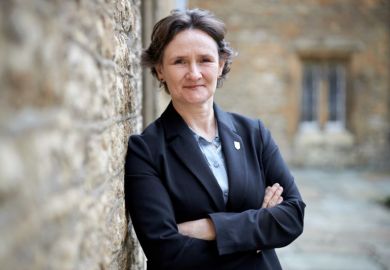It would perhaps be too easy to suggest that being an expert in pain is good training for taking on the vice-chancellorship of the University of Oxford.
Being the oldest university in the English-speaking world elevates it to a peculiar position in the British psyche: celebrated for being historic, world-leading and the trainer of future leaders, while at the same time attacked for its elitism and scrutinised at every turn, its ruin predicted regularly in the national press, often for contradictory reasons.
So, while Irene Tracey had not been widely tipped for the role, as soon as her nomination was announced it seemed to make perfect sense.
The neuroscientist is a world-renowned researcher and an Oxford insider who was born in the city and has spent almost her entire career at the university, running Merton College and the Nuffield department of clinical neurosciences along the way. Having risen to the top from a comprehensive school upbringing in the nondescript village of Kidlington, she epitomises the social mobility that Oxford is striving to achieve.
And she is a woman, a factor that is still important to a university that was run exclusively by men for eight centuries before Professor Tracey’s predecessor, Louise Richardson, was appointed in 2016.
Helen King, principal of St Anne’s College, Oxford and a friend of Professor Tracey, agreed that the appointment ticked a lot of boxes.
“If you are an academic, you’ll be pleased to see somebody with a very credible and eminent research background. For the colleges, there’s a sense she’s someone who really cares about colleges. For departments, Irene has experience of holding a leadership role. Everyone feels like she understands their world a bit,” said Ms King.
While Professor Tracey’s knowledge of the university will lend her instant credibility among staff, her appointment goes against the established wisdom of recent years that the changes Oxford is seen as needing can only be brought about by heavy hitters from outside.
Her three predecessors, Sir John Hood, Andrew Hamilton and Professor Richardson, all had glittering careers leading universities abroad but soon encountered the pitfalls of Oxford’s age-old way of doing things.
While Professor Richardson oversaw the university’s front-line role in the fight against Covid and can boast of progress made on attracting more students from disadvantaged backgrounds, there was also criticism of her £374,000 salary, debates over academic freedom and colonial legacies, the ongoing issue of how a multinational institution should handle Brexit, and a promised administrative overhaul which remains incomplete.
Gill Evans, an emeritus professor at the University of Cambridge and expert in Oxbridge governance, said she felt that Professor Tracey’s appointment marked the end of an experiment in modern vice-chancellorship that had, to varying degrees, “been a bit of a disaster”, in part because their power at Oxford is much more limited than their counterparts’ at younger institutions.
“They were brought in from outside and naturally enough thought the role of the vice-chancellor was to be a chief executive. Instead, you need to be more of a skilful diplomat and bring everyone together,” Professor Evans said.
David Palfreyman, bursar of New College, Oxford, said he saw the nomination of Professor Tracey as presaging a return to the old way of doing things, when the position rotated around college heads. He saw Professor Tracey’s background as meaning that she would be better placed to drive forward further improvements on diversity than somebody who had been “parachuted in because of their management skills”.
And while lacking a track record in the highest echelons of university governance, the scientist has leadership skills that shouldn’t be underestimated, friends said. Lea Milligan, chief executive of MQ Mental Health Research, where Professor Tracey serves as a trustee, likened working with her to sometimes feeling “a bit like a John Grisham novel”.
“There’s been plenty of times when there have been big discussions on the direction of travel and Irene has been very happy to put her position forward as the sole voice in the room. By the end of the meeting, the room can be completely turned and aligned with her and we‘re going in that direction,” he said.
Kevin Talbot, Professor Tracey’s successor as head of clinical neurosciences at Oxford, said her experience running the department will stand her in good stead.
“It’s a large and complex department, with about 500 people in one form or another, and one of the tasks is how you make such a diverse group of people belong to one entity,” he said.
“Irene’s qualities at doing that are exemplary; she is somebody who can motivate others like nobody else I know. She conveys a sense of positivity and forward motion which inspires people.”
He saw the vice-chancellor position as being primarily concerned with conveying what the university wants to tell the world, and it requires someone with a broad vision.
This, according to Professor Talbot, is another of his colleague’s great strengths: “With unbridled energy, she will go anywhere in the world and tell people in straightforward terms what’s important about what we do.”
Register to continue
Why register?
- Registration is free and only takes a moment
- Once registered, you can read 3 articles a month
- Sign up for our newsletter
Subscribe
Or subscribe for unlimited access to:
- Unlimited access to news, views, insights & reviews
- Digital editions
- Digital access to THE’s university and college rankings analysis
Already registered or a current subscriber?








